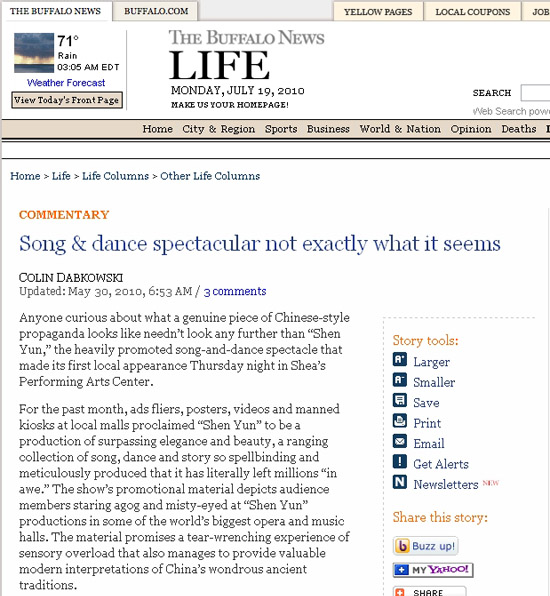Anyone curious about what a genuine piece of Chinese-style propaganda looks like needn't look any further than "Shen Yun," the heavily promoted song-and-dance spectacle that made its first local appearance Thursday night in Shea's Performing Arts Center.
For the past month, ads fliers, posters, videos and manned kiosks at local malls proclaimed "Shen Yun" to be a production of surpassing elegance and beauty, a ranging collection of song, dance and story so spellbinding and meticulously produced that it has literally left millions "in awe." The show's promotional material depicts audience members staring agog and misty-eyed at "Shen Yun" productions in some of the world's biggest opera and music halls. The material promises a tear-wrenching experience of sensory overload that also manages to provide valuable modern interpretations of China's wondrous ancient traditions.
Sounds pretty awesome, right?
I mean, who but the hardest- hearted cynic wouldn't want to surrender himself to all those head-spinning acrobatic moves, those eye-popping costumes and 3-Dvisual effects?
But this show –or rather its mammoth and insidious promotional machine –has left me in awe for a very different reason. The production, far from being a straightforward revue of Chinese dance, music and storytelling, is in fact a slick piece of propaganda pushing the viewpoint of Falun Gong, a spiritual group that has been persecuted by the Chinese government since the late 1990s. It is produced by New Tang Dynasty Television, a New York City-based group founded by Falun Gong followers.
"The Falun Gong stories in Shen Yun Performing Arts provide an important window into the realities of modern-day China and portray the traditional soul of Chinese people who are today facing unjust adversity," wrote YuKun Lu, whose company New Era Cultural Experience presented the Buffalo performance, inane-mail to The News. "They are stories of human spirit and human courage, and they are stories worth telling."
All true. But the problem with "Shen Yun" is not its endorsement of a specific religious and political viewpoint, nor that its production numbers portraying the oppressive tactics of the Chinese government have taken some audience members by surprise. In that respect, "Shen Yun" is laudable in its effort to bring human rights abuses perpetrated by the Chinese government to the attention of the American public.
The problem lies in the marketing of the production, which mentions absolutely nothing about the unique religious and political movement that drives the show, and without which the show would never have been conceived. In this way, the promoters and creators of "Shen Yun," who have picked up a reputation for misrepresentation and deception over the years, have adopted the questionable propagandist tactics of the very government they criticize in their productions. My repeated requests to interview a member of the company, or anyone associated with the production, were declined – a further indication of the group's tight message control.
These techniques include a "newspaper," The Epoch Times, which is little more than a mouthpiece for Falun Gong. The Buffalo edition of the publication contains nothing but gleamingly positive coverage of "Shen Yun." Look up "Shen Yun" in Google News and most of what comes back are articles from various international editions of the so-called newspaper extolling the virtues of the company. This shock-and-awe onslaught of positive articles is presumably meant to drown out investigative pieces about the group that have appeared in reputable news sources such as The New York Times, the Toronto Star and The Guardian, whose dance critic called a 2008 "Shen Yun" production "all too weird a mix of propaganda and bling."
Perhaps the creators of "Shen Yun" are so put off by the traumatic experiences of their past that they think the mere mention of Falun Gong will send potential audience members running. But their solution, far from engaging in an honest conversation with the public about the spiritual movement they seek to promote, is to wait until the audience is already in the seats to clue them in to the production's spiritual and political agenda.
If the Chinese expatriates of Falun Gong, who have been so mistreated at the hands of their former government, want to share their worthy and fascinating story with a broad international audience, the duplicitous techniques of propaganda are not the way to go.
A more daring and effective approach might be simply to tell the truth.
(Buffalo News,July 9, 2010)

Original text from: http://www.buffalonews.com/2010/05/30/1066022/songdance-spectacular-not-exactly.html